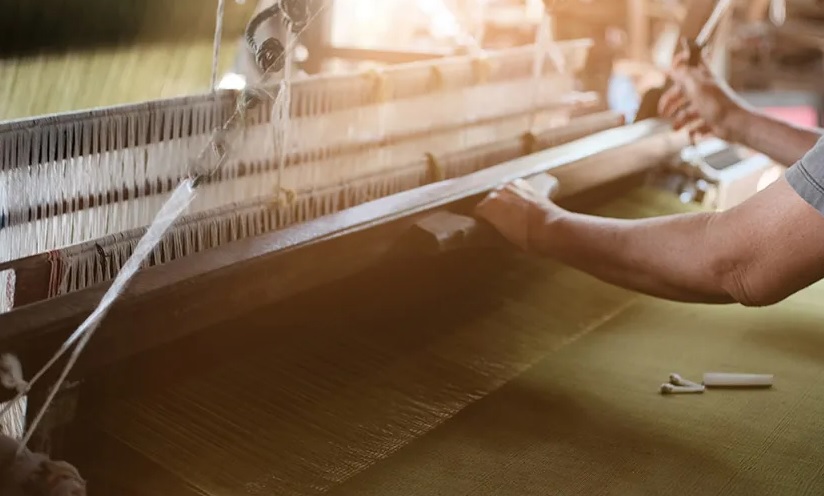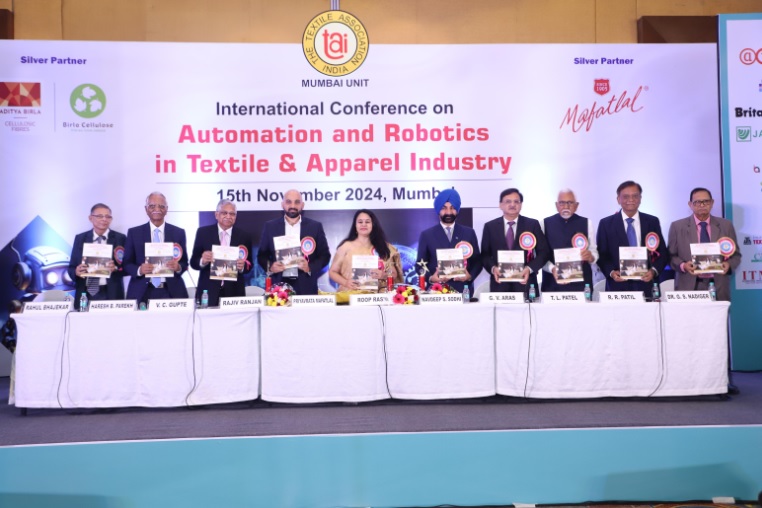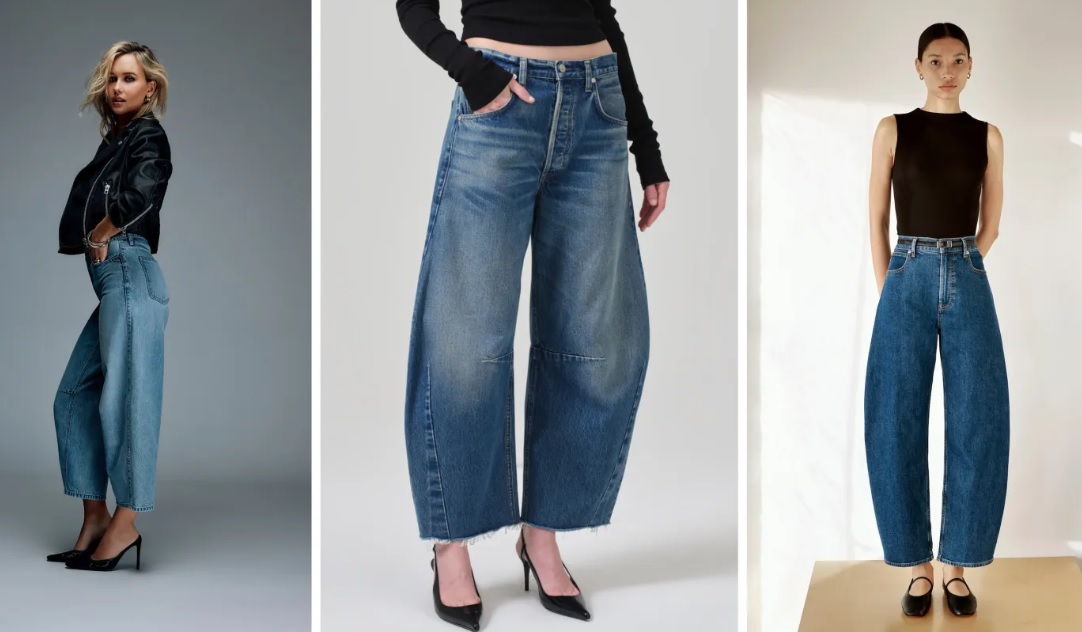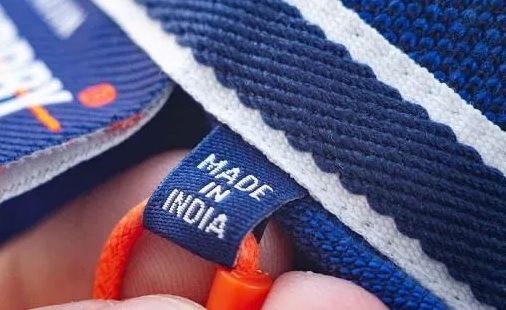FW
Lenzing has launched an innovative Fancy Denim collection in collaboration seven global mills including Advance Denim, Black Peony, BluGround, Gamatex, TCE, Vita Textile, and Xinsuntex.
The 20-piece garment collection is complemented by Lenzing’s own Application Innovation Centre, based at its Hong Kong headquarters.
Showcasing a variety of weights and styles, the collection incorporates unconventional fibers like lurex besides experimenting with unique constructions such as jacquard weaves, dobby, and knit-like textures. One of the highlights of this collection is a dyed indigo jersey that introduces classic denim shades, introducing classic denim shades into unexpected fabric choices.
The collection also features innovative finishing and wash techniques, including eye-catching laser effects. Its patchwork-inspired designs, garments in surprising shades like moss green and vibrant purple, denim pieces with metallic threads, and a range of patterns—from traditional Batik to abstract prints—add to the collection's diversity.
Through the laumch of this Fancy Denim Collection, Lenzing aims to challenge the industry and showcase the versatility of Lenzing fibers. By offering bold, unconventional ideas, the brand seeks to inspire new concepts and encourage designers to explore a wider range of possibilities.
YKK Corporation, based in Tokyo and led by President Hiroaki Otani, will introduce its latest innovation, the Natulon Plus zipper with recycled PET open parts, at the Functional Fabric Fair in Portland, Oregon, from November 19-21, 2024. Created in response to rising industry demands for recyclability, this product aims to enhance the garment recycling process.
The Natulon Plus zipper maximizes recycled PET material use. Both its chain and open parts are crafted from recycled PET, with YKK developing the injection-molded PET components in-house. Additionally, the zipper's metal slider is designed for easy sorting, facilitating recycling by reducing the need to remove it from garments.
Terry Tsukumo, YKK’s Vice President of Product Strategy, emphasized the need for longer-lasting, recyclable products to counteract garment waste. He noted that incorporating Natulon Plus in apparel supports YKK's commitment to circularity, enabling garments to be recycled without zipper removal.
This innovation aligns with YKK’s ongoing sustainability efforts, which include products like the Vislon Natulon zipper made with Econyl Regenerated Nylon for recyclable nylon garments. The company continues to focus on developing circular products that are recyclable and repairable, aiming to reduce environmental impact across the apparel industry supply chain.
India’s readymade garment (RMG) exports continue to thrive amid global disruptions, highlighted Sudhir Sekhri, Chairman of the Apparel Export Promotion Council (AEPC).
He credited the industry’s resilience, commitment to quality, and sustainable practices as key drivers of this growth, even as ongoing conflicts impact trade routes worldwide. The sector's strength in raw materials and a blend of traditional and modern designs have made India a preferred sourcing destination.
Looking ahead, AEPC is preparing Bharat Tex 2025, envisioned as India’s largest textiles fair, aimed at showcasing the country’s production capabilities to global buyers. “International brands are keen to source from India, and the response from our outreach efforts has been very positive,” Sekhri noted.
Mithileshwar Thakur, AEPC’s Secretary General, emphasized the current supply chain shifts due to challenges in Bangladesh and the search for alternatives to China, positioning India advantageously.
He urged government support through investment, capacity expansion, skilling, and financing for the labor-intensive, MSME-driven RMG sector. Thakur also requested the continuation and enhancement of the interest equalization scheme to 5 per cent for five years, which he believes is crucial to offset high capital costs and sustain export growth.
Karl Mayer has introduced a cutting-edge lace design for the luxury underwear and clothing sector, developed using the MJ 92/1 F machine with a unique, Ne 200/2 super-combed cotton yarn in jacquard. This innovative creation combines a clean fabric appearance with an intricate filigree pattern, meeting the demand for high-end, sophisticated textiles.
Initially conceived in the 1980s, Karl Mayer lace expert Jamie Heather realized the design on a Jacquardtronic Lace machine in F configuration. The machine’s setup, with the Jacquard bar positioned at the front, allows a nearly vertical yarn feed, expanding the tension tolerance for rigid cotton yarns. This setup enables intricate designs without thread breakage, creating durable, complex patterns.
The lace’s floral motifs are crafted without jacquard work behind the gimps, enhancing clarity in cross-dyeing. Only flat twisted yarns, including pre-dyed lurex and viscose, were used for the gimp threads to closely mimic the Leavers lace style. A central net section with cotton jacquard adds a handmade appearance.
Crafted on the advanced MJ 92/1 F machine, this lace was created with premium cotton sourced from Gebrüder Otto Baumwoll feinzwirnerei in Germany. Sascha Muller, Product Owner at Karl Mayer, highlighted this development as a step away from traditional standards in jacquard production, appealing to customers seeking innovation. Muller and Heather plan to showcase the lace at Interfiliere and Premiere Vision in Paris, introducing it to industry leaders.
LVMH has acquired a minority stake in Swedish fashion brand Our Legacy, reports The Business of Fashion. The transaction is a result of a strong performance from Our Legacy, which registered sales of €40 million ($42.9 million) for the year ending June 30.
The brand plans to use this investment to enhance operations and expand its global presence by opening flagship stores in major cities, including Paris, New York, Los Angeles, Tokyo, Shanghai, and Hong Kong. Currently, Our Legacy operates two stores in Stockholm, as well as locations in London and Berlin. Additionally, it operates three stores in South Korea in partnership with local distributor Handsome Corp. The brand also plans to open a new store in Paris late next year.
According to Jockum Hallin, Co-Founder, the investment is more about looking into the future as the brand enters the next phase of its growth.
Over the past month, global cotton markets experienced minor price fluctuations with trends showing stability or slight declines across key benchmarks, according to Cotton Incorporated.
On the New York Intercontinental Exchange (NY/ICE), December futures have remained within a range of 67 to 75 cents per pound since June. After hitting the higher end of this range in late September, prices dipped but have since stabilised around 71 cents per pound.
A benchmark for world cotton prices, the global A Index decreased slightly from 85 to 83 cents per pound. In China, the Cotton Index (CC Index 3128B) dropped from 101 to 97 cents per pound, or from 15,700 to 15,300 RMB per tonne. This decline aligns with a mild weakening of the yuan, which shifted from 7.05 to 7.16 RMB/USD, as detailed in Cotton Incorporated’s November 2024 Monthly Economic Letter on Cotton Market Fundamentals & Price Outlook.
In India, Shankar-6 quality cotton spot prices fell from 87 to 83 cents per pound, with domestic prices decreasing from Rs 57,400 to Rs 55,100 per candy. The Indian rupee remained relatively stable against the dollar at around Rs 84 per USD.
Pakistan’s cotton market remained steady, with spot prices fluctuating around 80 cents per pound. Domestically, prices traded between 18,200 and 17,600 PKR per maund, currently sitting at 18,000 PKR per maund, while the Pakistani rupee held firm at approximately 278 PKR/USD.
The Responsible Sourcing Network (RSN) has launched its first cohort of multi-stakeholder members for YESS(Yarn Ethically & Sustainably Sourced), marking a milestone in advancing transparency and accountability in textile sourcing. This shift to a membership model, introduced last year, enables deeper engagement in the industry to address forced labor and strengthen supply chain due diligence.
YESS’s inaugural brand members feature industry giants such as Adidas, Fanatics Apparel, Inditex, The Walt Disney Company, and Walmart Inc, all committed to reinforcing ethical practices within yarn sourcing. These companies are now actively collaborating with mills at various levels to enhance sustainability initiatives. Participating spinning and fabric mills gain access to YESS assessments and specialized training, building capacity for responsible sourcing and improved due diligence.
The program is set against the backdrop of evolving regulations like the EU's Corporate Sustainability Due Diligence Directive (CSDDD), which calls on companies to enforce human rights and environmental safeguards across their supply chains. Kristen Albertson, Walmart’s VP of Responsible Sourcing, highlighted the significance of collective action to protect worker welfare, with YESS serving as a vehicle for transparency and risk management.
Initial mill members, including Nishat Mills, Raymond Denim, Shahi Exports, and Sree Santhosh Garments, will be featured on the YESS Participating Mills list, accessible to members only. Civil society organizations, academic institutions, and associations, including the US Fashion Industry Association (USFIA) and Verite, also play vital roles in the initiative. Julia Hughes, USFIA president, emphasized the importance of accountability across the cotton supply chain, aligning YESS’s approach with laws targeting forced labor.
To expand globally, YESS will leverage e-learning platforms and international auditors. Management company Sumerra will oversee assessments in countries like Pakistan, India, Bangladesh, and Vietnam, with auditing conducted by ARCHE Advisors, ASSESS International, and TUV Rheinland.
By uniting brands, mills, and civil organizations, YESS aims to create a cohesive, effective due diligence framework to combat forced labor in cotton production, promoting sustainable and ethical practices industry-wide.

Zara, the flagship brand of Spanish fashion giant Inditex, is making significant strides in sustainability and innovation, aiming to lessen its environmental impact and revolutionize the textile industry. The company recently announced a €50 million fund dedicated to fostering innovation, primarily within the textile sector. This move underscores Inditex's commitment to a greener future, aligning with its ambitious pledge to halve emissions across its entire supply chain by 2030.
This new fund, managed by Mundi Ventures, will primarily focus on supporting startups developing groundbreaking materials and technologies with a reduced environmental footprint. This initiative builds upon Inditex's existing investments in sustainable technology companies, such as Circ a US-based firm specializing in textile-to-textile recycling, allowing for the creation of new garments from old ones, reducing waste and reliance on virgin materials. Zara has already collaborated with Circ on a clothing collection made from recycled polycotton blends. Zara has also teamed up with Galy, another US-based start-up pioneering a process to produce cotton in laboratories from plant cells, eliminating the need for traditional cotton farming and its associated environmental impact
Meanwhile, Inditex has committed to making 25 per cent of its garments from new fibers that do not yet exist on an industrial scale, and is investing heavily in their development, say media report. This ambitious goal highlights the company's dedication to pushing the boundaries of textile innovation and leading the industry towards a more sustainable model
Key initiatives driving Zara's sustainability efforts
Sustainable materials: Zara is increasingly incorporating sustainable materials into its collections. Organic cotton, recycled polyester, and Tencel Lyocell are just a few examples of eco-friendly materials being used. The company is also exploring innovative materials like lab-grown cotton and recycled textiles derived from discarded clothing.
Circular economy: Zara is actively promoting a circular economy model by encouraging the reuse and recycling of garments. Initiatives like the "Join Life" collection, featuring clothing made from recycled materials, and in-store clothing collection programs for recycling are key components of this strategy.
Reduced emissions: Zara is committed to reducing greenhouse gas emissions across its operations. This includes improving energy efficiency in stores and distribution centers, as well as working with suppliers to minimize their environmental impact. The company's goal to halve supply chain emissions by 2030 is a testament to its commitment to climate action.
Transparency and traceability: Zara is increasing transparency across its supply chain, providing customers with more information about the origin and manufacturing processes of its products. This allows consumers to make more informed choices and supports ethical and sustainable practices.
The Join Life’ collection serves as a prime example of Zara's commitment to sustainability. This collection features clothing made from more sustainable materials like organic cotton, recycled polyester, and Tencel Lyocell, produced using environmentally friendly processes. The Join Life label helps customers easily identify and choose sustainable options, further promoting conscious consumption.
While Zara and Inditex are making significant progress, challenges remain. Scaling up production of innovative materials and ensuring their affordability are key hurdles to overcome. Furthermore, consumer awareness and demand for sustainable fashion play a crucial role in driving industry-wide change. Zara's proactive approach to sustainability and innovation positions it as a leader in the fashion industry. By investing in research, collaborating with startups, and implementing sustainable practices across its operations, Zara is paving the way for a more responsible and environmentally conscious future for fashion.
Once a dominant force in the textiles and footwear sector, Sri Lanka's apparel industry is currently lagging behind emerging competitors like Cambodia. This is attributed to the inconsistent government policies that have hindered investments in Sri Lanka’s garment sector, says Sri Lanka’s Joint Apparel Association Forum.
Expected to reach $5 billion in total apparel exports in 2024, JAAF aims to increase these to $8 billion by 2025. To achieve this, the association calls for consistent government support and policies, particularly around free trade agreements (FTAs). Felix Fernando, Deputy Chairman, JAAF, emphasises on the need to form new FTAs with major markets like India, China, and Japan to attract investment and boost exports. Vietnam's success has been driven by the numerous FTAs secured by the country offering global buyers duty concessions, making it an attractive investment destination.
Meanwhile, Cambodia’s textile exports rose by 25 per cent to nearly $9 billion in during the first nine months of 2024 as against the same period in 2023. The country has now become the sixth-largest garment exporter to both the US and Europe. This success is partly due to Cambodia's 2023 ‘Industrial Transformation Map,’ which aims to modernise technology, encourage investment, and enhance skills training.
The broader Southeast Asian region, including Indonesia, Malaysia, Thailand, and Vietnam, has witnessed substantial apparel export growth since the end of COVID-19 restrictions. Wilson Teo, President, Singapore Fashion Council, highlights, yjr region’s integrated supply chain, cost-efficiency and improved infrastructure offers it a competitive advantage. The region has also made a shift towards sustainability, with manufacturers adopting eco-friendly practices, reducing waste, and investing in renewable energy, he notes.
Automation, digitalisation, and closer collaboration between manufacturers and brands are helping ASEAN textile companies advance their operations. Companies like Singapore-based Ghim Li are setting the standard with integrated textile production facilities across Southeast Asia, shipping millions of garments globally. This focus on innovation, sustainability, and strategic partnerships is driving the region’s apparel sector forward, positioning it as a key global player in textiles.
The Italian Trade Agency (ITA) has collaborated with the Italian Textile Machinery Manufacturers Association (ACIMIT) to introduce advanced textile technology in Indonesia. This initiative aims to offer innovative solutions to enhance efficiency and sustainability in Indonesia’s textile sector.
Speaking at a series of workshops held on Nov 12, Dr Paola Pinto, Trade Commissioner, ITA, said, the digital and automated solutions offered by Italian textile technology help boost productivity besides minimising environmental impact.
The workshops promoted these advanced technologies in Solo on Nov 12 and Bandung on Nov 14, 2024. Both these events provided Indonesian textile professionals with firsthand exposure to Italy's cutting-edge innovations. A total of 17 Italian textile manufacturers participated in these workshops showcasing their expertise in areas such as finishing, dyeing, non-woven fabrics, spinning, weaving, knitting, and textile laboratories.
Liliek Setiawan, Vice Chairman- Regional Representative Body, Indonesian Textile Association (API) for Central Java, highlighted, these workshops not only fostered B2B meetings for technology transfer but also laid the groundwork for strategic partnerships. These alliances could address the evolving challenges of the textile industry, including the shift toward sustainability.
This technology allows textile companies to remain competitive in a global market increasingly focused on sustainability, noted Setiawan. This initiative would elevate Indonesian textiles to a more modern and internationally competitive level, he averred.
Dr Marco Salvade, President ACIMIT emphasised the dual purpose of these workshops as both a showcase for Italian technology and a platform for mutual learning.
The introduction of Italian textile technology is expected to the textile industry in Java with insights into the latest developments in digitalisation, the Internet of Things (IoT), and sustainable practices. These innovations are seen as crucial for increasing productivity and reducing the environmental footprint of the local textile sector.












